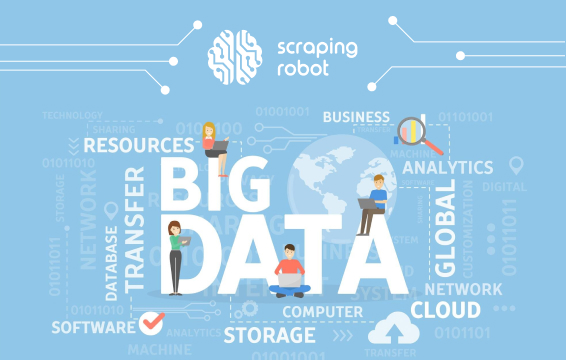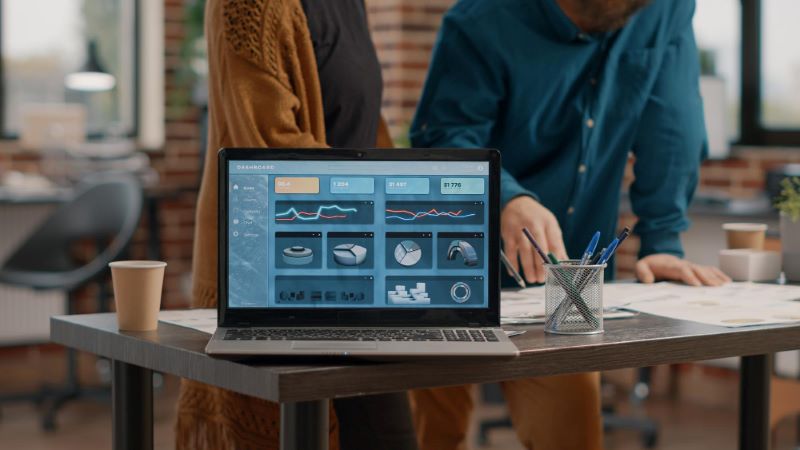Big Data For Small Business (What’s The Big Deal?)

There’s a common misconception around big data, much of which revolves around the phrase itself. So many small businesses think that big data is out of reach because they lack resources, tools or budget funds. Simply put, they think they’re “too small” for big data. It’s true that big data storage, analysis and implementation can cost more money than small businesses might have cut out in their budget. However, there’s more to the story: with the right tools and resources, anyone can make the most of big data, especially small businesses.
What is big data for small business owners? According to the Wikipedia experts, big data refers to data sets that are too big for most traditional data-processing software and applications to handle. While the term might ring overused on some ears (*cough* actual big data scientists *cough*), we’ll use the term to refer to incredibly large sets of data that are going to be pretty overwhelming for your average non-number-crunching-computer (sooo, most humans.) The reason that big data can seem so overwhelming for small businesses is right in the name: it just feels too big. If you collect large sets of data, you’re going to need to store it somewhere, and when you’re storing that much data, it can end up costing more than you’d think.
Table of Contents
If you’re looking to increase opportunities and grow your business, you’ve come to the right place. Stay tuned to find out why big data is important, the benefits that come from collecting it, and what tools we think can help you do the job. Let’s talk about why small businesses might want to start building their own data sets and get used to the idea of big data.
Why Pay Attention to Big Data Analytics?

The reason that bid data analytics matters might seem obvious, but think about all those times you did exactly what I just described above. Was it because you wanted to save time? Pride? It doesn’t really matter why we choose to make decisions before deciding to do the research, as long as we do what we can to learn from our mistakes. (In other words, as long as we commit to doing a better job of looking at the data.) When we take the time to do the research, we’re committing ourselves to finding results that actually make things better for our customers, our teams and our brands. Plus, data isn’t just about doing any research. It’s about good research to find the best, most valuable data that can lead your business to actionable insights and sustainable practices. Trust us: if you take the time to do the research, your business, team and audience will thank you in the end.
But we have good news. Maybe you’ve heard it before but found it hard to believe, so we’re here to say it again, and again, and again: small businesses can use big data and big data analytics. Here’s the other good news: that might mean starting small. That’s why we want to talk about the benefits of using big data (heck, all data) for your small business endeavors. If you want to improve your marketing strategy, learn from your competitors and engage better with your audience through various platforms, you’re going to want to pay attention to the data. If you’re not ready to handle “big data” in the way that data scientists, analysts and human-computers handle it every single day, you can start building your own valuable data sets for your small business that can grow, develop and improve the methods you take to reach your goals.
Best Big Data Tools for Small Business: Data Scrapers

Data scraping (or web scraping) is one way to start collecting data and using it for your small business. Data scraping is the process of using automated software to collect publicly available, unstructured data and putting it into a structured format (like a CSV or Excel file.) When I first started learning about data scraping, I thought it sounded too complicated for non-developers to learn to use. Sure, it’s true that certain data scraping tools require more web developing skills than others, but there are plenty of tools available that are perfect for beginners.
However, we at Scraping Robot believe that all people should have access to affordable data, no matter how skilled they are. That’s why our scraping modules are easy to use. Let’s talk more about how some of these individual tools can help your small business find success.
How Can A Small Business Use Big Data?

Again, there are plenty of benefits to using small business to improve your business. Without the proper tools and understanding, it can seem that these insights are only useful for big businesses with that manpower and budget. That might be true for some, but there’s more to data than meets the eye. If you’re a small business owner looking for ideas to improve your business in more areas than one, check out these ideas below that we think could help give you kick start.
Give your business the leg up it needs
As a small business, getting the leg up you need can feel pretty difficult, especially if you’re competing with larger companies that have had years to build loyalty and trust with their customers. Don’t let their head start discourage you. You can build the same following of loyal customers and valuable leads for your business simply by using the right data collecting tools.
Recruit even better talent for your team
Increase sales and decrease expenses
Remember how I said that collecting and using data can help you make better decisions? When it comes to finances and revenue, data scraping can really make a huge difference. Some new small businesses haven’t had the chance to collect data on their spending or find their place in the trends that affect their areas. With tools like the scrapers from Scraping Robot, you can pay more attention to these trends by scraping information from these social media accounts. You can pay attention to your competitors’ pages to find out when they offer sales, which can help you make better decisions about your own promotions.
Improve your audience engagement
Our social media scrapers have even more benefits, especially when it comes to building and growing your audience. When you use tools like our scraping API, you can gain valuable information about the people you’re following as well as your competitors. If you want to reach out to more valuable leads, you can scrape your competitors’ pages to find people who are interested in the product, service or other benefit you have to offer.
How Scraping Robot Reveals Small Business Data Insights

We’ve already shared some of the awesome tools that Scraping Robot offers for small businesses to get started collecting the data they need, and we’re proud to offer these tools for some of the most competitive prices in our industry. First of all, you get 5,000 free scrapes just for signing up. If you decide you need even more scrapes to get the data you need, you can add scraping credits to your account for $0.00045 per scrape. Plus, if these tools aren’t offering the exact solutions your small business needs, you can contact our dedicated customer support team to request a custom scraping solution. We’re developing more modules every single day to help our customers reach their goals, because when you ask, we listen!
Final Thoughts
If there’s one thing you take away from this article, we hope it’s the realization that any business and individual can benefit from big data, no matter your size, skillset or budget. If you don’t have the resources to store huge volumes of data just yet, then you can start smaller by using data scraping tools to get ahead of your competitors, find the best talent for your team and improve your financial situation. With the right tools, you can start benefiting from this data right away. We’re excited to help you get started!
The information contained within this article, including information posted by official staff, guest-submitted material, message board postings, or other third-party material is presented solely for the purposes of education and furtherance of the knowledge of the reader. All trademarks used in this publication are hereby acknowledged as the property of their respective owners.
Some Biographical Info
